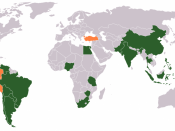�PAGE � �PAGE �1�
Gargi Ghugare
250470985
Philosophy 2074
Steve Michel Hebert
April 5, 2010
Sweatshops: Development or Decrease?
The exploitation of labor as a natural resource does not come up as a new concept in the world of MNCs. Light is shed on the exploitation of labor in developing countries by these MNCs on a daily basis. Human Rights activists attack MNCs constantly with the unfair use and exploitation of labor. Economists retort these attacks defending the view that improving the working conditions and wages would be morally wrong because doing so would lead to higher unemployment in developing nations. MNCs and other corporations have a moral obligation to ensure that their operations meet a minimal standard of care. A balance can be achieved and MNCs can voluntarily respect the basic rights of workers while remaining economically competitive.
All humans have basic rights that should not be violated irrespective of caste, creed, race or religion.
Due to economic growth, MNCs and other corporations are forced to improve their working conditions to attract a larger and better pool of labor. Free trade without labor restrictions generates future prosperity and better working conditions for the host nations by providing developing nations with access to cheaper goods and in turn opportunities to exploit cost advantages in export markets. Theoretical and empirical research suggests that one of the most effective ways the increase the competitiveness of a developing economy and to advance job prospects is to create a better-trained workforce through work experience and training.
MNCs have a moral responsibility to execute actions that satisfy the needs of the most people possible. Inventing and sustaining best satisfies the needs of those affected by sweatshops - i.e. the sweatshop employees, consumers, and the MNCs. The employees are best satisfied because of the higher...


